Patrick Wintour
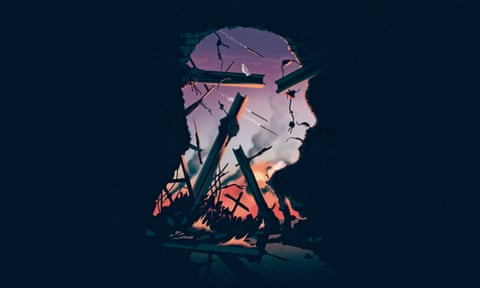
The Ukrainian writer Oksana Zabuzhko recalls a quote attributed to Otto von Bismarck: “Wars are not won by generals, but by schoolteachers and parish priests.” It’s a country’s taught collective memory, its shared sense of its own history, that are the decisive instruments for mobilisation, and are as important on the battlefield as weaponry.
Few conflicts have been so shaped by the chief actors’ sense of their own national story as the Ukrainian war that began in February. It is the competing grand narratives of the past, not just in Russia and Ukraine, but in Germany, France, Poland, the Baltics, the UK, the US, and even the global south, that make this war so hard to resolve.
Indeed, sometimes this war feels less like the end of history and more like the revenge of history.
Georgiy Kasianov, the Ukrainian historian, puts history in the cockpit of a conflict that may create a new world order. “Russian forces have been smashing their way through Ukraine spurred in large part by historical fiction,” he wrote in Foreign Affairs. “But history also propels the fierce Ukrainian resistance. Ukrainians, too, harbour a particular understanding of the past that motivates them to fight. In many ways, this war is the collision of two incompatible historical narratives.”
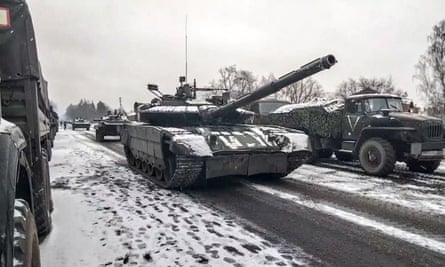
This video grab taken from a handout footage released by the Russian defence ministry on 7 March 2022 shows a purported Russian tank unit advancement in the Kyiv region. Photograph: Russian Defence Ministry/AFP/Getty Images
Putin is sometimes described not as commander in chief, but as Russia’s historian in chief. The ground for this war was prepared by the Russian president’s pseudo-historical essay On the Historical Unity of Russians and Ukrainians, published in July 2021. In this document, Putin argued Ukraine was, historically, indistinguishable from Russia, citing Oleg the prophet’s 10th-century dictum: “Let Kyiv be the mother of all Russian cities.”
Radosław Sikorski, the former Polish foreign minister, said he became sure an invasion would happen when he read that essay and learned Putin had ordered it to be sent to every serving Russian soldier. “The plan was to do again what Russia had repeatedly done to Ukraine in the past: extermination of its elites, Russification of its culture and population and the subjugation of its resources to its own imperial needs. Ukraine could be permitted as peasant folklore but not as a free and democratic nation choosing its own destiny and allies.”
When Putin talked about Ukraine needing to disarm and making Russian its second official language, it was not only about restoring Ukraine as part of Russia, but a staging post to the full reinvention of the Russian empire.
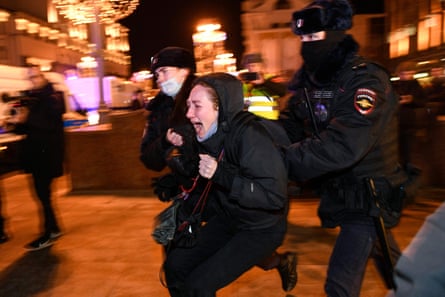
Police officers detain a demonstrator during a protest against Russia’s invasion of Ukraine in Moscow on 24 February. Vladimir Putin is sometimes described not as commander-in-chief, but as Russia’s historian-in-chief. Photograph: Alexander Nemenov/AFP/Getty Images
During his Victory Day speech in Moscow in May 2022, the president told Russian soldiers back from the Ukrainian front they were “fighting for the same thing their fathers and grandfathers did” – for “the motherland” and the defeat of nazism. The Ukrainian revolution of 2013 was a fascist “Banderite coup”, the government in Kyiv a “junta”, Nato enlargement an Anschluss, and the EU a decadent threat to Russian culture. Russia in 2022, according to Putin, was like the USSR in 1941, threatened by an invasion from the west.
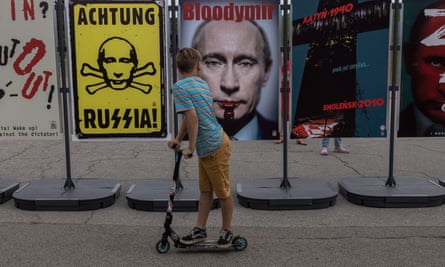
A boy looks at a poster with the likeness of the Russian president, Vladimir Putin, as he visits an outdoor poster exhibition titled Victory Day at the National Museum of the History of Ukraine in the second world war in Kyiv, Ukraine, 9 August. Photograph: Roman Pilipey/EPA
Zabuzkho argues that this deep historical sense of injustice and betrayal drives not just Putin, but the whole of Russian society. “One wants to find Russians who are not preoccupied with self-pity right now. The feeling of injustice is one of the most distinct symptoms of the moral breakdown that characterises so much of Russian society today.”
Ukraine, too, has its own sense of injustice and points its accusatory finger at Russia. Olesya Khromeychuk, director of the Ukrainian Institute in London, argues: “Ukraine’s historical experience – of statelessness and struggle, repressive external rule and hard-won independence – has shaped Ukraine into the nation we see today: opposed to imperialism, united in the face of the enemy, and determined to protect its freedom. For the people of Ukraine, freedom is not some lofty ideal. It is imperative for survival.”
Ukraine’s identity took time to form after it gained independence in 1991. Two narratives competed – one national and nationalist, the other Soviet nostalgic. This was not unique among post-Soviet states, but the process was never more intense or confrontational than in Ukraine.
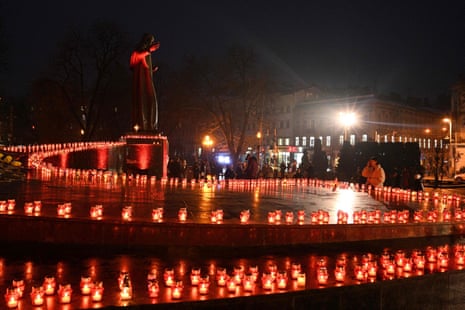
People gather in Lviv to commemorate the victims of the 1932-33 Holodomor, a human-made famine that killed millions of Ukrainians. Photograph: Yuriy Dyachyshyn/AFP/Getty Images
Battles were fought over school textbooks, monuments, the choice of national anniversaries, street names, state archives, or the status of the Holodomor – the human-made famine of 1932-33 that killed millions of Ukrainians – as a genocide. Under the “historical presidency” of Viktor Yuschenko between 2005 and 2010, 159 historical decrees were issued, the vast majority about the de-communisation of Ukraine.
In the process history was often royally misused. The Ukrainian Institute of National Memory for instance between 2014 and 2019 came to be dominated by a narrow group of rightwing nationalists that defined Ukraine in purely ethnic anti-Russian terms.
Unpopular leaders such as Petro Poroshenko relied on increasingly divisive and crude ethnic appeals to patriotism, thinking it was the shortcut to remaining in power. In 2015 the government even issued a set of “memory laws” that made questioning the official, deeply anti-Soviet view of Ukraine’s past punishable with prison terms of up to 10 years.
It was not until the advent of Volodymyr Zelenskiy and the “independence generation” – those who grew up after Ukraine left the Soviet Union – that Ukraine addressed issues of the past, identity and language in a more inclusive way, as Olga Onuch sets out in her book The Zelensky Effect. Zelenskiy, a former comedian and actor elected in 2019, understood the importance of history. Indeed, in the opening series of Servant of the People – the TV show that made his name – Zelenskiy plays a history teacher trying to convince his pupils of the importance of Mykhailo Hrushevsky, the historian who, in 1903, first tried to show how Ukrainian history was not merely a part of an overarching Russian story.
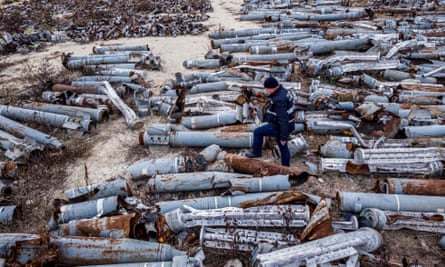
An expert of the prosecutor’s office examining collected remnants of shells and missiles used by the Russian army to attack the second largest Ukrainian city of Kharkiv. Photograph: Aleksey Filippov/AFP/Getty Images
In his new year address in 2020, Zelenskiy asked Ukrainians to ask themselves, “Who am I?”, and not find an answer by simply excluding others. “Our passports don’t say whether we are the right kind of Ukrainians or a wrong one. There is no entry there, saying ‘patriot’, ‘Maloros’ [a derogatory term used to describe a Ukrainian native with no national identity], ‘vatnik’ [a derogatory term for a pro-Russian citizen] or ‘Banderite’ [a derogatory term for a Ukrainian nationalist]. It says: ‘citizen of Ukraine’, who has rights and obligations. We are all very different.” The idea was to live together with respect.
Onuch and her co-author, Henry Hale, argue Zelenskiy was critical to giving Ukrainians a chance to “realise they shared a rich common fate that transcended linguistic, national and religious diversity”. This generation did not want just to shed their Russianness, but find a new Ukrainian civic identity linked to a hard-fought idea of common values. As a Russian-speaking Jewish person from south-east Ukraine, Zelenksiy was perfect to demonstrate how Russian-speaking Ukrainians, including those in the east, could fully identify with the Ukrainian state and express their patriotism.
That mattered when the war began. The Polish historian Adam Michnik argues that the future of Ukraine as part of Europe was always going to depend not only on the western cities of Lviv and Kyiv, but also on the cities to the south and east, Kharkiv and Odesa. “There is no doubt, under Putin’s rockets, both Kharkiv and Odesa chose Europe.”
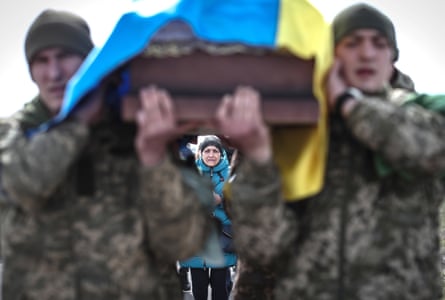 ‘Under Putin’s rockets, both Kharkiv and Odesa chose Europe’. A funeral ceremony for a Ukrainian soldier in Odesa, Ukraine, in March 2022. Photograph: Sedat Suna/EPA
‘Under Putin’s rockets, both Kharkiv and Odesa chose Europe’. A funeral ceremony for a Ukrainian soldier in Odesa, Ukraine, in March 2022. Photograph: Sedat Suna/EPAIn short, Putin was invading a country that very much existed – one he no longer understood.
The FSB told the Russian president that a superior army could capture Kyiv and decapitate its leadership in hours, as it had in Crimea in 2014, since it was invading an artificial and politically apathetic country that distrusted its leaders. Just to make sure, it supposedly spent $1bn fomenting discontent among the Russophone population in Ukraine and promoting pro-Russian politicians. Unfortunately, the FSB’s agents siphoned off some of the money and then fabricated data on pro-Russian attitudes to please Moscow.
As a result, many Russian soldiers, poorly briefed on the invasion, seemed genuinely bewildered by a Ukrainian volunteer defence force determined to protect their homeland. When they reached cities such as Kherson they were greeted with shotguns, and not flowers.
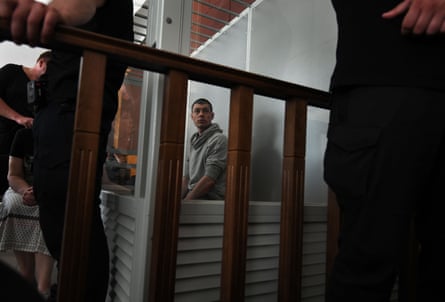 Russian soldier Kulikov Mikhail, 31, sits in a glass enclosure at a war crimes trial in Chernihiv, Ukraine on 30 June 2022. Accused of violating the laws and customs of war, he was the operator-gunner of a T-72b tank and on 26 February received an order to shoot at a residential apartment building using a high-explosive fragmentation projectile. He has admitted guilt and repented. Photograph: Carol Guzy/Zuma Press Wire/Rex/Shutterstock
Russian soldier Kulikov Mikhail, 31, sits in a glass enclosure at a war crimes trial in Chernihiv, Ukraine on 30 June 2022. Accused of violating the laws and customs of war, he was the operator-gunner of a T-72b tank and on 26 February received an order to shoot at a residential apartment building using a high-explosive fragmentation projectile. He has admitted guilt and repented. Photograph: Carol Guzy/Zuma Press Wire/Rex/Shutterstock“The Ukraine in your news and the Ukraine of real life are two entirely different places,” Zelenskiy warned Russians on the eve of the invasion, “and the difference is that the latter is real”.
By day three of the invasion it was apparent to Russian commanders that serious mistakes had been made from which the operation has never fully been able to recover. Russia’s hubris and overconfidence led to false assumptions that sabotaged the mission.
The UK defence secretary, Ben Wallace, provided a concise summary of the critical importance of Russia’s initial mistakes. He told a Lords select committee in November: “This war has exposed the whole pitch about ‘night one, day one’. You might translate it as saying, ‘When the balloon goes up, you take out the air defence of your adversary and then you can pick and choose at will and do your targeting.’
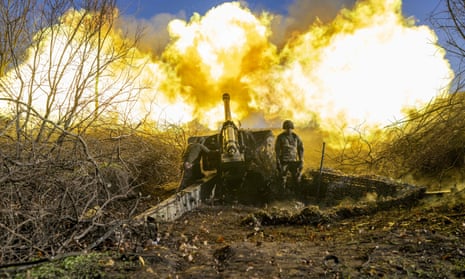
A Ukrainian soldier in an artillery unit fires towards Russian positions outside Bakhmut in November. Photograph: Bülent Kılıç/AFP/Getty Images
“What if you do not manage to do that on day one, night one, and it takes three weeks, as the Russians found out? On their day one, night one, the Ukrainians rather cleverly drove out of their barracks, dispersed their arsenals or used deception in their air defence capabilities. Knowing that this was going to happen, the Ukrainians used false trails for where their air defence was so that Russia hit all the wrong places. Suddenly, day one, night one becomes three weeks, four weeks. You run out of your complex weapons and you are now where the Russians are.”
Ten months on from the initial invasion, Ukraine’s extraordinary resilience and courage has staved off defeat, but not guaranteed victory. Europe’s post-cold war security landscape has changed, and yet nothing is settled. This is still a moment of transition.
The Russian chess grandmaster Garry Kasparov describes the war as “more like a game of poker than chess. On a chess board, all the pieces are face up, but poker is essentially a game of incomplete information, a game where you have to guess and act on those guesses.”
The most difficult guess is estimating how long the other side can withstand this level of destruction in terms of manpower, ammunition and morale. Each side has to increase the cost of war for the other in the hope the enemy is close to cracking.
Yet the toll is already massive. The US chief of staff, Mark Milley, claims as many as 100,000 Russian soldiers have died. Based on open-source references, the Oryx site determined that the Russians had lost a total of 1,491 main battle tanks since 24 February, of which 856 different types were destroyed, 62 damaged and 55 abandoned, and the Ukrainians had taken more than 518. Russia, albeit involuntarily, became Ukraine’s most important arms supplier.
00:52Ukraine 'not afraid of dark', says Zelenskiy as Russian attacks trigger blackouts – video
By one calculation, the US has spent 5.6% of its annual defence budget to destroy nearly half of Russia’s military capability.
The successive battlefield defeats have damaged the reputation of the great Russian military. First there had to be the “regrouping” in the north, when Russia realised it could not take Kyiv and Chernihiv. On 6 September came the stunning collapse of the Russian front in the north-east in the Kharkiv region. On 11 November Russia withdrew from the port city of Kherson, retreating from territory it had announced as annexed and part of Russia only 40 days earlier. The goal of establishing a land corridor to Transnistria – a Russian-backed breakaway region of Moldova, one of Ukraine’s western neighbours – is, for now, abandoned. Since September Ukraine says it has reclaimed more than 8,000 sq km (3,089 sq miles) of Russian-occupied territory.
The most pivotal stories and debates for Europeans – from identity to economics to the environment
Privacy Notice: Newsletters may contain info about charities, online ads, and content funded by outside parties. For more information see our Privacy Policy. We use Google reCaptcha to protect our website and the Google Privacy Policy and Terms of Service apply.
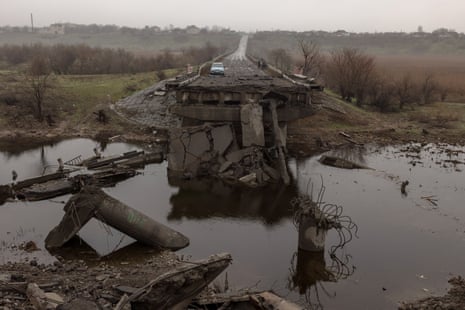
People stand near a car on a destroyed bridge outside Kherson, southern Ukraine, on 26 November. The Russian army were accused of deliberately destroying critical infrastructure during their withdrawal from the city of Kherson, including electricity and water supplies. Photograph: Roman Pilipey/EPA
Russia has also paid a toll in lost diplomatic prestige. In meetings with Central Asian republics, Putin sometimes find himself humiliated and contradicted, and there is talk of a security vacuum in the Caucasus as Russian prestige withers. Positive diplomatic support for Russia, as opposed to hedging, is confined to Belarus, North Korea, Syria and Eritrea. In one international diplomatic body after another, the “Russia not welcome” sign is going up. The Chinese defence minister, Wei Fenghe, in June said his country would not be providing one bullet to Russia, portraying the relationship as a partnership, not an alliance.
In the annual Anholt-Ipsos Nations Brands index, published in November, Russia has fallen from 27th out of the 60 nations polled to 58. The founder of the index, Simon Anholt, says: “Such a collapse in a country’s national prestige will cripple the ability of its business, its government and most importantly its people to trade and engage with the international community. It will do so for years, if not generations, and will inflict more damage than any economic sanctions”.
Cumulatively that has left Putin not looking for a way out, but a way to stay in the war. Mark Galeotti, the author of Putin’s Wars, believes Moscow has now clearly moved from winning the war to not losing it, and that requires trying to outsuffer the west. Orlando Figes summarised it recently: “The war is now entering a new phase because winter has arrived and the Russians are going to dig in. That is why they are ceding the western bank of the Dnieper River. The current phase is to destroy Ukrainian infrastructure, to create a refugee problem, and start an economic war against the west. That’s where the war will be played out and everything will be decided. What determines the outcome of the war will be how willing western societies are to continue supporting Ukraine.”
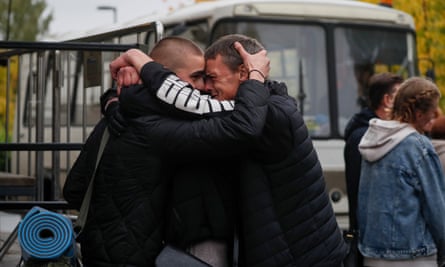 Conscripted men say goodbye to relatives at a recruiting office in Moscow, September 2022. Photograph: Yuri Kochetkov/EPA
Conscripted men say goodbye to relatives at a recruiting office in Moscow, September 2022. Photograph: Yuri Kochetkov/EPAAgain, national stories will play their part in testing that resolve. Moscow had bet on a return to American isolationism and a Trump triumph in the midterm elections in November. The theory was that in swing districts, Americans would rise up against the cost of gas and the war. It is true a slow erosion of support for the war among Republicans emerged in some polls, but Joe Biden seemed to tell a more compelling story about democracy under threat in the US and in Europe.
As a result, Biden has been left with greater scope than expected to continue to shape his own Ukraine policy in the next two years.
At the start of December, Michael McCaul, the lead Republican on the House foreign affairs committee, defined that scope by saying Republicans would not be advocating an end to US funding, but greater scrutiny and decisiveness. Given Biden has provided Ukraine with more than $18.6bn in security assistance and $13bn in direct economic assistance, it was hardly surprising McCaul demanded more accountability for US spending. But his main point was different. “The problem right now is Iranian drones are going into Crimea, but the Ukrainians can’t hit those Iranian drones unless they have the longer-range artillery called the ATACMS [army tactical missile system]. For some reason … [the Biden administration] will not put those weapons into Ukraine. When we give [Ukraine] what they need, they win. If we don’t, it’s going to be a long and protracted war.” They are not the remarks of a man bent on reviving the American isolationist tradition.
If the US is for the moment closed off as a choke point, Putin’s next best option was Berlin. But the energy blackmail he directed at Germany now looks as likely to explode in his own face as bring about German deindustrialisation.
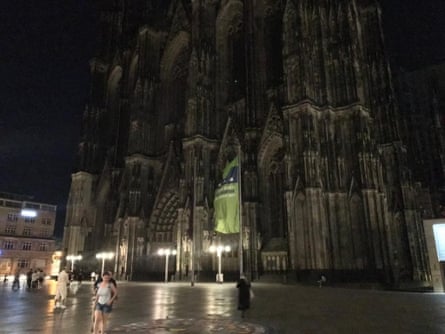
Cologne Cathedral’s lights are switched off in an effort to reduce dependence on imported natural gas from Russia and impose energy-saving measures in Germany. Photograph: Mesut Zeyrek/Anadolu Agency
Through a mixture of state planning and individual parsimony, Germany has weaned itself off Russian energy, an extraordinary achievement for a country that was dependent on Russia for 55% of its gas. German industry has reduced gas consumption by about 25% since the year’s start, while production has only fallen by 1.4%. The state has found alternative suppliers, including in Norway, the Netherlands, Belgium and France.
Given the state of German reserves, blackouts this winter seem less likely in Europe, even if next winter is more worrying.
Germany has led the efforts to quell anger about rising bills by constructing hugely expensive subsidy packages. Since the start of the energy crisis in September 2021, according to the Bruegel Institute, a staggering €705.5bn (£614bn) has been allocated or earmarked across European countries to shield consumers from the rising energy costs.
But will it be enough? The nights are longer, the thermometers have dropped and energy bills are landing, so the witching hour is here. The recurring nightmare of Zelenskiy’s young strategic communications team is that Ukraine’s suffering drops out of the news, and the country, once synonymous with freedom, becomes a burden. “Our principle is simple,” says Andriy Yermak, the president’s chief of staff. “If we fall out of focus, we are in danger.” The attention of the world serves as a shield.
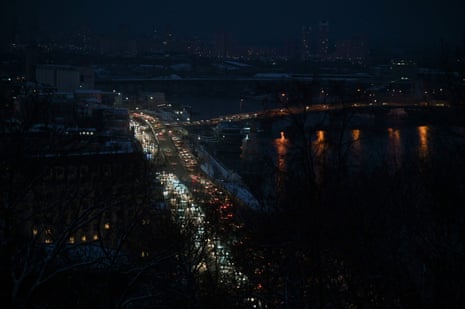
A view of the Ukrainian capital of Kyiv during a partial blackout on 13 December. Photograph: Sergei Supinsky/AFP/Getty Images
So far the drumbeat of rebellion is faint and confined to the fringes on the left and right.
That has forced Putin to switch tactics again and resort to different tools of war to weaken Europe’s resolve. The attacks on civilian energy structure that began in October are not only designed to create misery in Ukraine, but to make neighbourhoods uninhabitable, so creating an exodus from the cities and a second wave of Ukrainian refugees that the west cannot tolerate. The Ukrainian MP Lesia Vasylenko, pointing out 14 million Ukrainians are already displaced, including 7 million abroad, frankly admitted to British politicians she feared the mood towards Ukrainian refugees might be about to change. Alarm bells are already ringing about the bullying of Ukrainians in schools, she said.
But according to the Polish migration expert Prof Maciej Duszczyk from the University of Warsaw, 70% of Ukrainian refugees cross the Polish border, and in Poland, again for historical reasons, there is no sign of a backlash yet. For Poland, Russia is synonymous only with conquest, partitions, genocide, colonialism and communism. Whatever its past or present differences with Ukraine, the two countries know that in Russia they share a common enemy, according to Duszczyk. Poland is now home to approximately 1 million refugees from Ukraine (and as many Ukrainians who lived there before the war). Nearly 60% have found jobs. In elections next year, Duszczyk does not expect the refugee issue will feature.
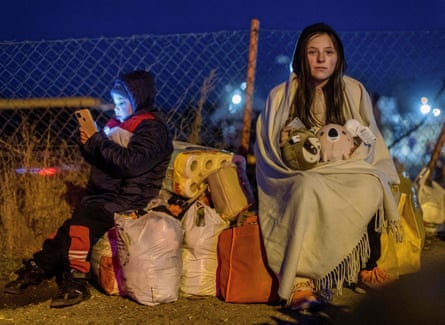
Helena and her brother Bodia from Lviv, Ukraine, at the Medyka pedestrian border crossing, in eastern Poland in February 2022. Photograph: Wojtek Radwański/AFP/Getty
That is not to say the influx is painless. In Warsaw alone, schools and nurseries have taken 18,000 kids, and Warsaw’s mayor is appealing for European financial support. Duszczyk says so far the position at the border crossing is stable, but admits each morning to getting an update on the weather and status of electricity stations in Kyiv. “Are we, as a state and society, ready for a second wave of refugees from Ukraine?” he asks.
If Poland did decide it is full, or tried to play electoral politics with Germany over the issue, as many as 2 million more refugees could, in theory, move on to countries in western Europe, predominantly Germany. By one estimate that might cost an estimated €48bn a year.
Manfred Weber, the German head of the European People’s party, the pan-European conservative political grouping, says Germany may be sleepwalking into a crisis. “Due to Putin’s reign of terror, I’m afraid we are going to have a dramatic winter of flight. The reception centres in Germany are full, the municipalities are groaning, also in countries like the Netherlands, Belgium and Austria. It looks like we will have to open more gyms in Germany in a few months and restrict school and sports operations because they could be full. Germany is not prepared for this situation.”
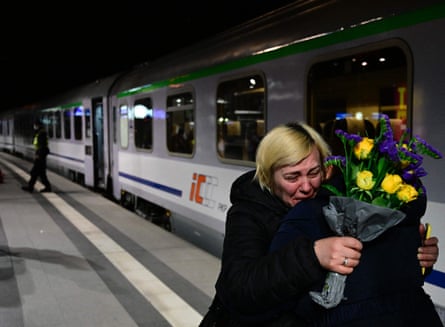 A woman is comforted by a friend after arriving on a train from Ukraine’s border at Berlin’s main train station on 2 March. Photograph: Tobias Schwarz/AFP/Getty Images
A woman is comforted by a friend after arriving on a train from Ukraine’s border at Berlin’s main train station on 2 March. Photograph: Tobias Schwarz/AFP/Getty ImagesMore than any other European country, Germany will determine whether the continent stays the course with Ukraine. Wolfgang Ischinger, the former German diplomat, says Germany has been the European country most willing to change its foreign policy and shed its worship of the status quo. At one level Germany has spent the past 12 months shedding its postwar mindset. Olaf Scholz’s zeitenwende signalled €100bn investment in its depleted army. Germany agreed to send anti-tank missiles and Stinger missiles into a war zone. The country’s president, Frank-Walter Steinmeier, for years the country’s most vocal proponent of compromise with Russia, went to Kyiv to apologise. He said Germany’s dependency on Russian gas had been a strategic error, born of a stubborn misreading of Putin. “In the face of evil, goodwill was not enough.”
Annalena Baerbock, the Green foreign minister, went further, arguing the Social Democrats’ Ostpolitik had been based on a false historical analysis. Germany’s moral debt of “special responsibility” bound Germany not to Russia, but primarily to Jews and Poles, Belarusians and Ukrainians, and only then to the Russians. She argues, in a formula that Scholz avoids: “We will achieve security only without, not with Vladimir Putin’s Russia.”
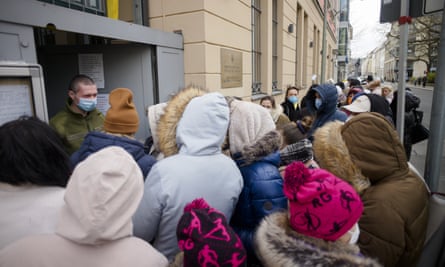 People from Ukraine, most of them refugees fleeing the war, wait in front of the consular department of the Ukrainian embassy in Berlin, Germany, 1 April. Photograph: Markus Schreiber/AP
People from Ukraine, most of them refugees fleeing the war, wait in front of the consular department of the Ukrainian embassy in Berlin, Germany, 1 April. Photograph: Markus Schreiber/APIn so doing she comes closer than Biden, Macron or indeed Scholz in siding with those who say the war must end with Putin being seen to have been defeated, an articulation that raises hard questions about Europe’s future relations with Russia. But Baerbock is not ultimately in charge. “Zeitenwende is a catchphrase and we do not really have a mental and strategic shift. Yes, more money is being spent, but it is the same people with the same bureaucratic cautious mindset running German foreign policy. It is all about processes,” says Dr Stefan Meister at the German Council for Foreign Relations.
 A family sits in a train during an evacuation from Pokrovsk, Donetsk region, 30 November. Photograph: Anatolii Stepanov/AFP/Getty Images
A family sits in a train during an evacuation from Pokrovsk, Donetsk region, 30 November. Photograph: Anatolii Stepanov/AFP/Getty ImagesOne senior Baltic diplomat promises there will be a reckoning when the war is over that will see a shift away from the Franco-German centre of gravity. He says “Everyone understands the reasons for Germany’s pacifism and, yes, often in the end they do the right thing, but only after they have exhausted every other possibility and in the process completely damaged their own reputation.”
A Ukrainian diplomat concurs. “We have to get rid of this constant fear of escalation in certain capitals. It is what holds us back, and it misunderstands the nature of Russian and the existential conflict we are fighting.”
That returns the conflict to Putin’s view of what he described as Russia’s historical future.
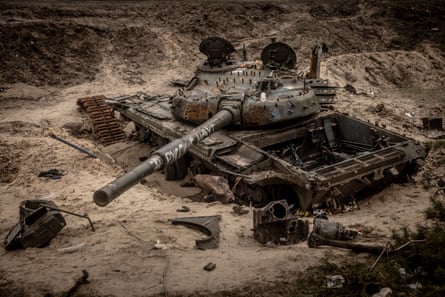 A destroyed Russian tank by the side of the road in Kupiansk, which was occupied by Russian forces days after the 24 February invasion – hastened by the surrender of Kupiansk’s Russia-friendly mayor. Photograph: Chris McGrath/Getty Images
A destroyed Russian tank by the side of the road in Kupiansk, which was occupied by Russian forces days after the 24 February invasion – hastened by the surrender of Kupiansk’s Russia-friendly mayor. Photograph: Chris McGrath/Getty ImagesJade McGlynn, an Oxford academic and author of the forthcoming Russia’s War, explains why it is so hard for Russia to relinquish Ukraine. “Sergei Lavrov [the Russian foreign minister], for instance, says that without Russia, Ukraine does not have any history. But it is actually the opposite. Without Ukraine, Russia’s understanding of its own identity – this third Rome, based on Orthodoxy, this gathering of all the lands of Rus – does not really work. You cannot espouse this state messianic role if you cannot convince ethnic Russians to join you in cultural communion and you to have bomb them.
“That is why it is going to be very hard for Russia ever to accept this war has failed.”a
No comments:
Post a Comment